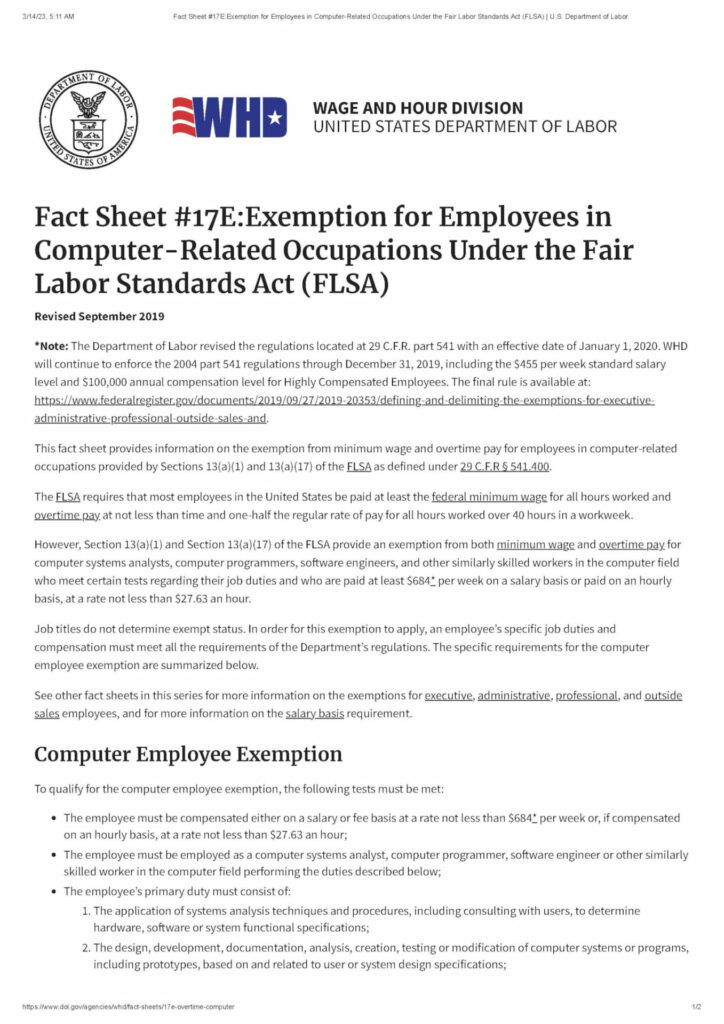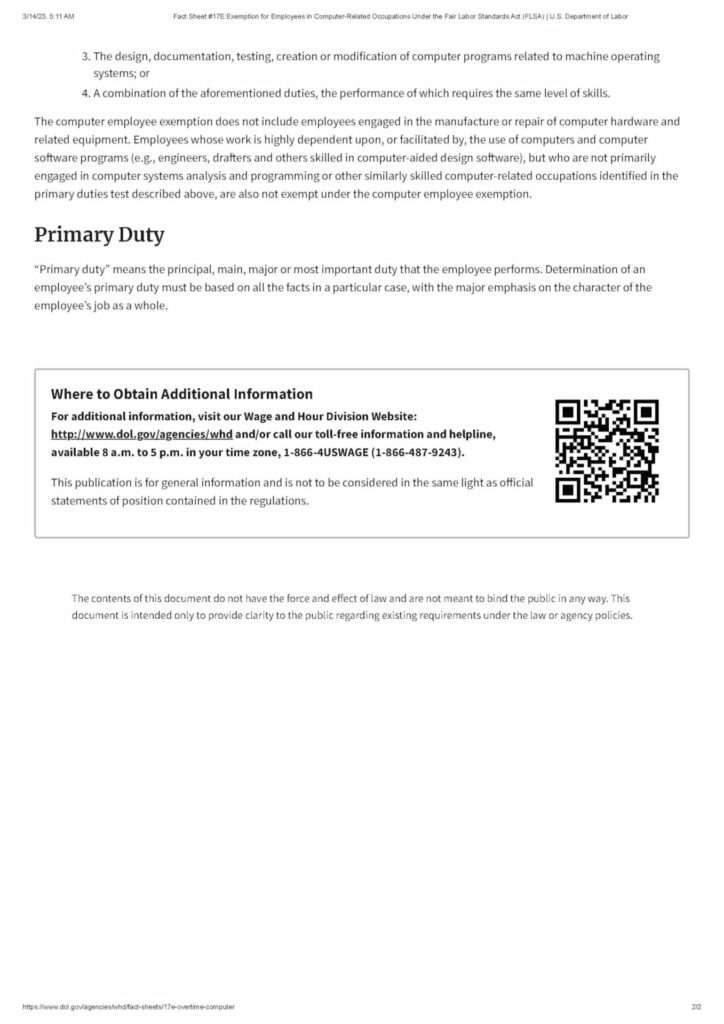
The Fair Labor Standards Act and California law require overtime payment to all employees unless their work fits within one of the statute’s exemptions. The burden of proof for establishing that an exemption applies to a particular position rests with the employer, and the exemptions are narrowly construed against employers seeking to assert them.
As of January 1, 2023, California employers must compensate their computer professional employees with an annual salary of $112,065.20 or more ($9,338.78 a month or $53.80 an hour) to be exempt from overtime pay under California law. This post addresses whether the computer professional exemptions and/or the administrative employee exemptions apply to information technology/computer staff.
Exempt computer professionals must perform certain work duties to qualify as exempt employees. Examples of an exempt computer professionals may include a skilled computer programmer, software engineer, computer systems analyst, or computer employee working within particular software system design specifications.
Additionally, computer employees are not the only California workers that are exempt from the above laws. Other exempt laborers include professional employees, executive employees, similarly skilled workers, outside salespersons, and administrative employees.
California courts narrowly construe the computer professional exemption. Computer professionals in California, to the extent they are properly classified as exempt, are not covered by the following employment laws and rights:
For example, a computer programming and software engineering professional is not entitled to a minimum hourly rate that applies to every workweek. Nor is the professional guaranteed – by law – a minimum salary level.
California employers not protected by the above laws are often referred to as exempt employees or exempt workers. Those covered under the laws enjoy a non-exempt status.
California labor laws say that workers qualify as exempt computer professionals if they pass both the:
According to this test, workers get labeled a “computer professional” if they satisfy the job duties test and:
California state law says that workers are computer professionals if they make at least $53.80 per hour. For 2023, if paid a salary, exempt computer professionals must be paid at least $112,065.20 a year (or $9,338.78 a month).
The job duties test is a bit more complicated than the salary test. It also means that a worker must be involved in more than the use of hardware-software or systems on computers to be exempt.
Part 1 of the test says that a worker qualifies as a computer professional if the worker is:
As to this last requirement, note that it cannot be met by job titles alone.
“Primary duty” means the principal, main, major, or most important duty that the employee performs. Determination of an employee’s primary duty must be based on all the facts in a particular case, with a major emphasis on the character of the employee’s job as a whole.
Part 2 of the primary duties test says that workers are exempt if the employee's primary duty consists of one or more of the following:
The qualification will apply only if a primary duty consists of either one of the above or a combination of the aforementioned duties.
Note that an employee must pass both part 1 and part 2 of the job duties test for the computer employee exemption, to be labeled an exempt employee. Just working on computers does not make an employee an exempt computer professional.
The Fair Labor Standards Act (FLSA) is the federal statute that exempts computer professionals from minimum wage requirements, overtime exemption, and meal and rest breaks. The FLSA is the federal statute that also puts computer professionals in an exempt status. The FLSA is enforced by the U.S. Department of Labor (DOL).
Unlike certain other categories of exemptions under the FLSA, there is no requirement that Computer Professional hold any specific degrees or certifications. Although Computer Professionals are generally understood to be employees with a certain degree of expertise in their field, the Federal Regulations specifically acknowledge that “[w]hile such employees commonly have a bachelor’s or higher degree, no particular academic degree is required for this exemption.” 29 C.F.R. § 541.303(c).
The specific level of educational attainment held by an employee is therefore irrelevant for determining exempt status, and the determinative factor is the job requirement and not the education in fact acquired by the employee.
However, the FLSA Computer Professional exemption is not available to an employee whose job "merely" requires “highly specialized knowledge of computers and software.” Instead, to qualify for the exemption, an employee’s job duties must meet a higher standard, requiring ‘the theoretical and practical application of highly-specialized knowledge in computer systems analysis, programming, and software engineering.’


Like under California law, the FLSA Computer Professional exemption does not include employees engaged in the manufacture or repair of computer hardware and related equipment. Employees whose work is highly dependent upon, or facilitated by, the use of computers and computer software programs (e.g., engineers, drafters, and others skilled in computer-aided design software), but who are not primarily engaged in computer systems analysis and programming or other similarly skilled computer-related occupations identified in the primary duties test described above, are also not exempt under the computer employee exemption.
Administrative, professional, and computer employees may also be paid on a salary or fee basis. If the employee is paid an agreed sum for a single job, regardless of the time required for its completion, the employee will be considered to be paid on a “fee basis.” Fee payment is generally paid for a unique job rather than for a series of jobs repeated a number of times. To determine whether the fee payment meets the minimum salary level requirement, the test is to consider the time worked on the job and determine whether the payment is at a rate that would amount to at least $455 per week if the employee worked 40 hours.
Furthermore, the FLSA computer professional exemption does not include employees whose job duties fall within the ambit of “help desk” services or whose primary duty is to provide troubleshooting support. An IT technician responsible for installing and upgrading hardware and software on workstations, configuring desktops, checking cables, replacing parts, and troubleshooting Windows problems would, therefore, not qualify as a Computer Professional, even though the job necessarily requires some degree of specialized computer knowledge.
In making this distinction, courts have distinguished between, on the one hand, employees who merely perform “predetermined specifications in [a] system design created by others” and, on the other hand, employees whose technical duties involve “the consistent exercise of discretion and judgment in its performance.”
Employers who believe that some of their employees may qualify for the Computer Professional exemption should proceed with caution before classifying an employee as exempt under the FLSA or California law. In determining whether or not the FLSA’s or California's Computer Professional exemption applies to your employees, consult with an attorney about those employees’ specific job duties in order to decide how your employees should be classified.
Sometimes an employer may misclassify a worker as a computer professional. If this happens, then the employee may be able to file a wage/hour lawsuit against the company and collect any unpaid wages.
At Freeburg & Granieri, APC, we aim to provide you with excellent service. An attorney with at least ten years of litigation and trial expertise will handle and supervise your case.
If you are an exempt computer professional or other similarly skilled worker who believes they have been misclassified, or have questions about any of the above, Book a free consultation today!
Our clients become friends, confidants, and repeat customers. Former clients are our best referral source.
Do not be a commodity, find an attorney who treats your legal issue with the care it deserves.

